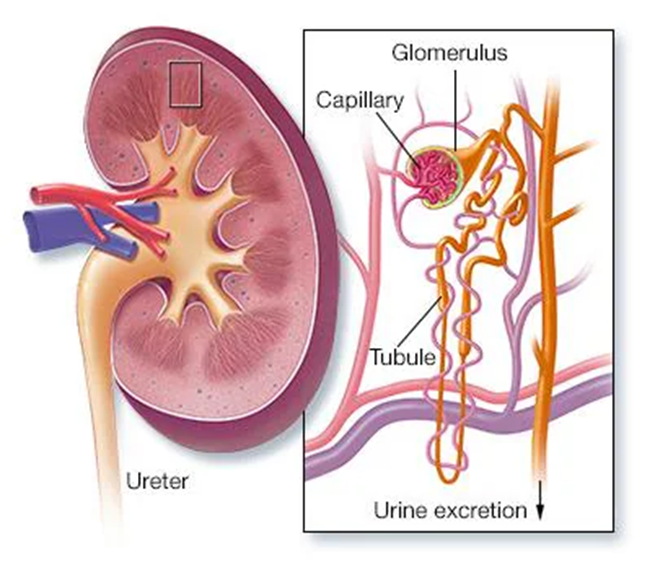A school-age child has been admitted to the hospital with an exacerbation of nephrotic syndrome. Which clinical manifestations should the nurse expect to assess? (Select all that apply)
Facial edema
Cloudy smoky brown-colored urine
Weight loss
Frothy appearing urine
Correct Answer : A,D
Choice A reason:
Facial edema is a common clinical manifestation of nephrotic syndrome in children. This occurs due to the retention of fluid in the tissues, which is a result of the kidneys leaking protein into the urine (proteinuria). The loss of protein reduces the oncotic pressure in the blood vessels, leading to fluid accumulation in the interstitial spaces, particularly noticeable around the eyes and face.

Choice B Reason:
Cloudy smoky brown-colored urine is not typically associated with nephrotic syndrome. This symptom is more indicative of hematuria, which is the presence of blood in the urine. Hematuria is more commonly seen in conditions such as glomerulonephritis rather than nephrotic syndrome.
Choice C Reason:
Weight loss is not a characteristic symptom of nephrotic syndrome. In fact, children with nephrotic syndrome often experience weight gain due to fluid retention. The accumulation of fluid in the body can lead to an increase in weight, rather than a loss.
Choice D Reason:
Frothy appearing urine is a hallmark sign of nephrotic syndrome. The frothiness is due to the high levels of protein being excreted in the urine (proteinuria). When protein is present in the urine, it can cause the urine to appear foamy or frothy.
Nursing Test Bank
Naxlex Comprehensive Predictor Exams
Related Questions
Correct Answer is ["A"]
Explanation
Choice A reason:
A specific gravity of 1.010 indicates that the child’s urine is adequately diluted, suggesting proper hydration. Normal urine specific gravity ranges from 1.005 to 1.030. A value of 1.010 falls within this range and indicates that the kidneys are functioning well and the child is not dehydrated.
Choice B reason:
Moist mucous membranes are a sign of adequate hydration. When a child is well-hydrated, the mucous membranes in the mouth and other areas remain moist. This is a positive indicator that oral rehydration therapy has been effective in restoring the child’s fluid balance.
Choice C reason:
Capillary refill time of less than 3 seconds is another indicator of proper hydration and good peripheral perfusion. This means that the blood is circulating well throughout the body, and the tissues are receiving adequate oxygen and nutrients. A capillary refill time of less than 3 seconds is considered normal and suggests effective rehydration.
Choice D reason:
A sunken anterior fontanelle is a sign of dehydration in infants. When the fontanelle is sunken, it indicates that the child has lost a significant amount of fluid. Therefore, this finding does not indicate that oral rehydration therapy has been effective. Instead, it suggests that the child may still be dehydrated.
Choice E reason:
A heart rate of 146/min is elevated for an 8-month-old child1. Normal heart rates for infants range from 80 to 160 beats per minute. While this heart rate is within the upper limit of normal, it can also be a sign of dehydration or other stressors. Therefore, it is not a definitive indicator of effective rehydration therapy.
Correct Answer is C
Explanation
Choice A reason:
Opioid analgesics are not given as a last resort solely because of the threat of addiction. While the risk of addiction is a concern, opioids are often necessary for managing severe pain, especially in conditions like sickle cell anemia. The American Society of Hematology guidelines emphasize the importance of effective pain management in sickle cell disease, which often includes the use of opioids. The goal is to manage pain effectively while monitoring for signs of misuse or addiction.
Choice B reason:
Opioid analgesics are often ordered and are usually needed for managing severe pain in patients with sickle cell anemia. Pain episodes in sickle cell disease can be extremely severe and debilitating, requiring potent analgesics like morphine for relief. The management of acute vaso-occlusive pain in sickle cell disease often necessitates the use of opioids to provide adequate pain control.
Choice C reason:
Opioid analgesics, when medically indicated and used under proper medical supervision, rarely cause addiction. The risk of addiction is significantly lower when opioids are used appropriately for pain management in a controlled medical setting. The Mayo Clinic highlights that while opioids have addictive properties, their medical use for pain relief, especially in acute settings, is generally safe when monitored by healthcare professionals.
Choice D reason:
Opioid analgesics are not used only if other measures, such as ice packs, are ineffective. While non-pharmacological measures can be part of pain management, opioids are often necessary for managing severe pain episodes in sickle cell disease. The use of opioids is based on the severity of the pain and the clinical judgment of the healthcare provider.
Whether you are a student looking to ace your exams or a practicing nurse seeking to enhance your expertise , our nursing education contents will empower you with the confidence and competence to make a difference in the lives of patients and become a respected leader in the healthcare field.
Visit Naxlex, invest in your future and unlock endless possibilities with our unparalleled nursing education contents today
Report Wrong Answer on the Current Question
Do you disagree with the answer? If yes, what is your expected answer? Explain.
Kindly be descriptive with the issue you are facing.
